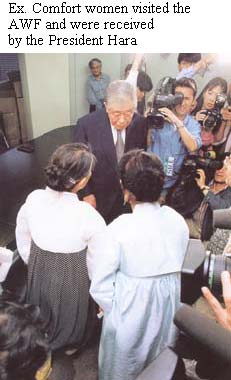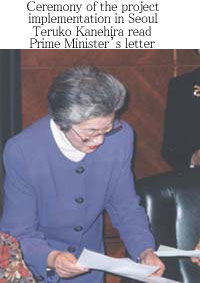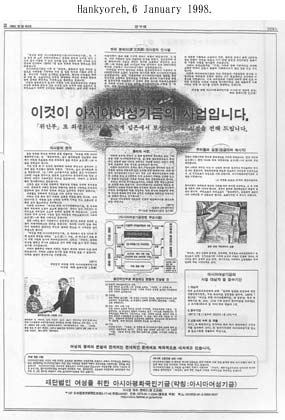 |
Projects by country or region-South Korea |
|
  |
|
|
|
Country or Region |
Period
for Applications &
Project Implementation |
Project
Description |
|
Republic of Korea |
11 Jan. 1997 - 5 May. 2002 |
-
Payment of "atonement money"
(2 million yen)
-
Provision of medical and welfare support projects (valued at 3 million yen)
Delivery of the Japanese Prime Minister's letter, etc.
|
|
| |
|
Background |
In 1965, Japan and the Republic of Korea signed the Korea-Japan Treaty, settling financial issues regarding colonial rule and establishing diplomatic relations. At that time, Japan agreed to provide the Republic of Korea with economic assistance in the form of 300 million dollars in grant aid and 200 million dollars in loans (without expressing remorse or apologies for the damage and suffering caused by colonial rule), while the Republic of Korea waived all claims for material restitution and the right to claim compensation. As a result, it was recognized that issues between the two countries and between their nationals, regarding material restitution and the right to claim compensation, were "completely and finally" resolved.
However, this conclusion met with dissatisfaction in the Republic of Korea. After the comfort women issue became a matter of contention in the 1990s, the Government of the Republic of Korea established a committee to authenticate former comfort women, and had authenticated 207 as of November 2002. The Government provides these women with a fixed monthly sum to subsidize their living expenses. Of the 207 authenticated people, 72 had died, 135 were still alive, with 2 of them residing outside the country, as of November 2002.
The Government of the Republic of Korea initially showed a favorable stance toward the establishment of the Asian Women's Fund. But the stance changed to disfavor, basically because one non-governmental organization supporting the victims, the Korean Council for the Women Drafted for Military Sexual Slavery by Japan, or "Chongdaehyop," mounted a vigorous campaign against the Asian Women's Fund, and because of criticism in the media, as well.
The former comfort women varied considerably in their attitudes. Some criticized the Fund and repudiated it. Others were dissatisfied that the Fund was involved, but still wanted to accept project benefits. Those who had publicly stated they intended to accept benefits were criticized, and pressure was applied against them. Some of these women reluctantly issued another statement repudiating the Asian Women's Fund.
The Korean Council promoted a vigorous campaign, taking its cause to the UN Commission on Human Rights and working in solidarity with similar groups in other countries. The campaign was influential in bringing the comfort women issue to the attention of the international community. At the heart of the Korean Council's campaign are calls for the Japanese Government to acknowledge legal responsibility, apologize, pay compensation, and punish those responsible.
 Project implementation
Project implementation
The Asian Women's Fund's position was that it wished to implement projects in the Republic of Korea for victims so authenticated by the Government of that country. In August 1996, a Team for Dialogue composed of members of the AWF Advisory Committee visited the Republic of Korea, met with about a dozen victims, and explained the Fund's projects to them. Of the victims who met with the Team for Dialogue, Kim Hak-Sun and two others stated that they repudiated the project of the Fund. Many of the others took the position that it would be hard to view the Fund's measures as sincere, considering that the amount was only 2 million yen per person.
In December 1996, Ms. Kimiko Kaneda (not her real name) announced that she appreciated the Fund's efforts and intended to accept its project benefits. Pressure was applied against her to refuse them, but soon another six victims announced that they too would accept benefits. On 11 January 1997, representing the Fund, its Director, Teruko Kanehira, gave seven of the victims the Prime Minister's letter at a hotel in Seoul(Movie is here ). ).
After the ceremony, Ms. Kanehira gave explanatory materials to different media in the Republic of Korea (Full text ), explained details regarding project implementation, and outlined the Fund's basic position. However, the media in that country, with only a few exceptions, criticized the Fund's project implementation. The Korean Council also protested, and strong pressure was applied against the seven victims who had received Fund benefits. ), explained details regarding project implementation, and outlined the Fund's basic position. However, the media in that country, with only a few exceptions, criticized the Fund's project implementation. The Korean Council also protested, and strong pressure was applied against the seven victims who had received Fund benefits.
|
 |
Both the victims and the Fund found it hard to bear the fact that the atonement money and other benefits had led to pressure being applied on the victims who received them. The Fund therefore froze its projects temporarily and took steps hoping to improve conditions for project implementation in the Republic of Korea.
However, a campaign was mounted to collect private donations within the Republic of Korea, to persuade women to refuse Fund project benefits. The donations were used to provide victims with a fixed amount of assistance money. The seven victims who had accepted benefits from the Fund's atonement projects were excluded from the program.
|
|
| |
After some difficult reflection, on 6 January 1998 the Asian Women's Fund placed advertisements explaining its projects in four newspapers in the Republic of Korea, including the Hankyoreh and the Hanguk Ilbo, and announced it was resuming its projects. Soon after, the Fund received word from some victims that they wished to receive benefits, and resumed project implementation.
|

Kim Dae-Jun became President of the Republic of Korea in March that year. In May, the new administration decided that, although it would not demand state reparations from the Japanese Government, it would pay 31.5 million won (at the time, about 3.1 million Japanese yen), plus an additional 4.18 million won from capital collected by the Korean Council ("Chongdaehyop,") as living expense subsidies to each former comfort woman who vowed to refuse Asian Women's Fund project benefits. The Government of the Republic of Korea paid this sum to 142 people, but did not pay it to 11 people — the seven who had accepted Fund benefits in the early stages, and four others who did not sign the written oath because they had accepted Fund benefits.
In June 1998, the Asian Women's Fund sent a letter signed by Fund President Bunbei Hara to the President of the Republic. The letter stated the belief that atonement money from the Fund and living expense subsidies from the Republic of Korea were different in nature, and requested that the Government acknowledge it should be possible to accept both.
However, the position of the Government of the Republic of Korea did not change.
Realizing there was no change in the project situation, the Fund decided to halt its projects of atonement in the Republic of Korea at the beginning of 1999, and change the project objective to group medical care. At the same time the Fund decided to issue payments to victims who had already begun the application process. The Fund began negotiations with the Korean side. However, it eventually became clear that the Fund would be unable to obtain the cooperation of the Korean side, even with a new project objective. As a result, the Fund gave up hope of pursuing a new project objective, and placed the projects in the Republic of Korea in a state of suspension, in July 1999.
Those who had accepted Fund project benefits sent their thanks, such as: "I never thought that during our lifetime I would receive apologies from the Prime Minister and money. I know they express the feelings of good will of the Japanese people. Thank you very much."
Another person needed money for a medical operation, and decided to accept Fund project benefits. At first she said she did not want to meet a Fund representative. But she eventually did, and when the representative read the Prime Minister's letter aloud to her she raised her voice, broke down in tears, hugged the representative, and began to speak through her tears about her experiences as a comfort woman and the suffering she had endured after returning to her own country (more detailed explanation see ). Understanding the situation, we felt apology and remorse expressed by Japanese Government and people were accepted. ). Understanding the situation, we felt apology and remorse expressed by Japanese Government and people were accepted.
|
|
The seven who initially accepted Fund benefits, and the others who did so confidentially, were placed in a psychologically painful situation because of the strong influence of activist groups that regard the Fund's atonement projects in the Republic of Korea as a way for the Japanese Government to avoid responsibility. The Fund kept up its efforts to ensure that all those who accepted atonement project benefits would be socially accepted, but unfortunately the current situation shows that these efforts did not bring positive results.
During the time the projects remained in a state of suspension, the 10 January 2002 deadline for applying for project benefits, as initially announced in newspaper advertisements, drew closer. Believing it should make one final effort, the Fund decided not to terminate the projects on the 10 January deadline but to leave them in suspension. But after negotiating with some people, the Fund realized that it could not change the situation a great deal in the short term, so it lifted the project suspension on 20 February, and terminated projects in the Republic of Korea on 1 May 2002.
Asian Women's Fund projects were concluded in the Republic of Korea without obtaining the full understanding of activist groups or the Government there. Even so, many more victims than we had first predicted agreed to accept the Prime Minister's letter of apology and benefits from the Fund's atonement projects, and for this we are grateful.
|
|
|
|
  |
|
|

